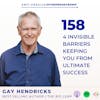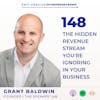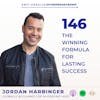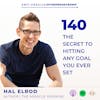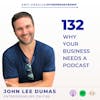How to Increase Engagement With Your Audience Overnight w/ Tyler Foley
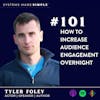
If you’re struggling to come with marketing ideas for your business that incorporate your story, today’s episode is for you! You’ll learn how to identify the most impactful parts of your life. Plus, you’ll find out how to generate compelling social media content around them.
When it comes to marketing your business, what is the compelling story you are sharing?
If you struggle to identify impactful parts of your life or feel like your story simply isn’t exciting enough for social media content, today’s episode will change your mind.
As a child actor turned author, speaker, and business advisor, Sean Tyler Foley coaches others on how to impact an audience with their stories and how to incorporate their message into marketing ideas with confidence.
BY THE TIME YOU FINISH LISTENING, YOU’LL LEARN:
- How to tell a compelling story with your marketing (even when your life isn’t that exciting)
- How to create better, more engaging social media content for your audience
- Why teaching is a better tool than selling when it comes to your marketing ideas
- How to position your story in a way that attracts your ideal clients
_____________
Liked this episode? Pay it forward and share it with a friend.
Love the show? Write a 5-star review — even one sentence helps us keep bringing you the content you want to hear.
More from Courtney:
- Website: theeffortlesslife.co
- Instagram: @thecourtneyelmer
Some product links on this site are affiliate links, which means we'll earn a small commission for any affiliate purchases you make (at no additional cost to you). We only recommend products that we use and/or personally trust, so you can browse with confidence.
All Rights Reserved | © The EffortLESS Life®
[INTRO TRACK]
Courtney Elmer 3:09
I can't wait to introduce you to my guest today, Tyler Foley or Sean Tyler Foley. He has been acting in film and television since he was six years old. And now he coaches others on how to impact an audience with their stories and customer engagement. I wanted to bring him to you is because learning how to tell my own story in a compelling way for customer engagement something that I really struggled with the beginning of my business.
Courtney Elmer
If you've been listening for a while, then you've likely heard bits and pieces of that story like overcoming an eating disorder and cancer, overcoming cancer. The problem was I didn't know how to make these moments that were big and impactful for me, and customer engaging. How did I make those connections with my audience. And how can I make those moments customer engagmi
Courtney Elmer
Through a lot of trial and error, I was able to make some sense of it and start using my story for customer engagement in a deeper way. But then I became desensitized to my story because I had told it so many times that it wasn't impactful anymore, because the way I was telling it was an impactful. And one of the things that I kept hearing from people, particularly my students was that, Courtney, you have a great story, but I don't, my life's not exciting. I haven't overcome anything big to speak of like you have. And so on one end of the spectrum or the other. We were all struggling to tell our story in a relatable way for customer engagement. And I will say now Knowing what I know now about storytelling and the power of it, and using storytelling in your business, there is an art form to it. And it's something you have to master if you really want to grow your customer engagement in a much deeper way.
Courtney Elmer
Tyler is here today to help you identify the most impactful parts of your life story, and show you how to get customer engagement, tell a compelling story, even when your life doesn't feel exciting. And this, in turn, is going to help you position your story in a way that helps you attract more of your ideal clients, and create more customer engagement and ultimately, make you more memorable. So you can cut through all the noise that's out there, and really stand out in people's minds. Tyler, welcome to the AntiFragile Entrepreneurship™ Podcast. I'm glad you're here today.
Courtney Elmer 6:01
So have I and you know, when I was looking at you and your background and your expertise, I thought, This is gonna be a really interesting conversation. And I think a timely one too for our audience. Because at the time of this recording, we're about to flip the calendar into a new year. And so the energy typically of this season, at least for me, last month of the year, it's kind of tying up loose ends on the existing year and then thinking about what the heck do I want to achieve in the year ahead? How do I grow my business, build my authority, have customer engagement and get people to notice me on Social Media?
Courtney Elmer
And maybe we're not asking ourselves that our ego is probably asking ourselves, maybe we're not outright saying that right? Like, how do I become more of an authority and increase customer engagement? But I think that's the thing we all desire, we all want connection, we all want better customer engagement, more - leads more sales? As business owners, that's the lifeblood of our business- customer engagement. So how do we build that authority? How do we create those connections on social media? And you have a very unique way of doing getting customer engagement that I'm excited to have you share. And before we get to that, I'd love to have you share with us your story and how you got into doing what it is you do today?
Tyler Foley 7:30
Well, I'll tell you Courtney Elmer, it is very circuitous. I started on stage when I was six years old, very young age and loved it instantaneously. And from stage progressed into film and television, and made a 20 year career out of acting, and performing. And at 25. After 20 years in the business, I did what most people who've had a 20 year career do and I retired from it and went back to school, got an engineering discipline behind my belt.
Courntey Elmer, I started my own company, I took pictures of the ground and made maps out of them. And now anybody who has used Google Maps ever and has turned satellite view on knows exactly what I'm talking about that I used to make those out of planes and taking pictures of the ground.
That company unfortunately did not do well. Google definitely has cornered the market and satellites have become better and better and better. And the need for aerial photography has become less and less and less. And I could see the writing on the wall. I had taken all of the safety training and so a friend of mine, who runs his own electrical company asked if I would come and be his safety manager for him. And I took that gig.
Next thing I knew Courtney Elmer, I was in the middle of nowhere building multi million dollar industrial complexes and running safety meetings. And a couple of people would ask me, How do you do that? Like how do you get up and talk? And a few executives actually asked if I could help them and coach them on how to give better presentations and have customer engagement. And next thing I knew I no longer was working in safety, and was all of a sudden this executive coach, and helping people craft their stories and speeches, and customer engagement. I found a second life as a trainer, both as a safety trainer and now as a professional speaker, coach.
Courtney Elmer 10:34
That's awesome. Isn't it crazy, where our life takes us all the twists and turns. Sometimes we can't see around that bend in the road. But then at a certain point we can see that every little thing was leading us in the direction we were always meant to go.
Tyler Foley
In a reverse retrospective, my path is incredibly linear. But when I was six there, it would be the most winding road to the top of this mountain, I'm sure.
Courtney Elmer 11:00
Yeah, absolutely. I know. I think everyone listening can relate to that. I know I can. I mean, there's been this point in my own journey and my own story where I'm like, What the heck is this? Where is this gonna go. But then it always winds up going the direction that it was meant to.
Courtney Elmer
So you have this amazing storytelling talent. Now helping others do the same thing with customer engagement. And I think this is one of the things we were talking a bit about this before we hit record. But as business owners, sometimes it feels like, Well, my life is pretty boring. Like, I don't really have a story to tell. My customer engagement is low. I want to connect with others and to grow my following and to be an authority. But how do I do that? And how do I find those points within my own journey that make me unique and have customer engagement? And that set me apart from someone else? Can you speak to that a little bit?
Tyler Foley 12:03
Courtney Elmer, To be fair, I think that I don't have an exciting life or story and people like when I say that, at the the push back I get on that is extreme, because people are like, Well, you were a child actor. You did stunts, you're in Freddy vs. Jason, you got to meet Robert Eglon you have customer engagement. And I'm like, Yeah, but that was work. I think that's where people really don't see the greatness in themselves. Nobody knows us longer than ourselves.
Courtney Elmer, One of the things that I've worked with my clients and have built the customer engagement system around, is coming up with at least five very unique moments in our life that we can focus in on and say, that was an event that had a profound impact on me. And they're really easy to find. Take your age, and divide it by five. And so that you get five even time periods in your life. And you can use simple third grade math to when we used to divide to the even or divide to the whole, and you had like the remainder.
Whatever you did with the remainder, you didn't even worry about dividing it into other stuff. I'm 42. If I divide my age, using simple third grade math into five even time periods, I take that two and go forget it and I go 40 divided by five is eight. And then with that little two remainder, I tack it on to the beginning, the very first time period because nobody ever remembers what they did for the first two years of their life anyway.
My first time period is from zero to 10. Then I look at that time period. And I say what are what is the memory that stands out the most for me? In that time period, zero to 10. What if I was to say, what is your most significant, your most profound? What is your your greatest memory from that time? Good or bad? What is it and for me, I have two very, very clear, very distinct memories from zero to 10. Both of them actually happened when I was six years old.
Both of them are auditory. And the first one is the sound that an audience ever made. clapping the first time I ever got a standing ovation and applause and that. It's a sound and it's a feeling that comes with that You know, hearing that wave of energy hit my body, and feeling the joy and the pride and the accomplishment of knowing that people enjoyed. What I had done is has set my life and my career in motion because now I seek that high on a daily basis because nothing in the world can compare to the feeling and the joy that comes from having an audience applaud your work. And then the other most significant sound, and one again, that has influenced my life.
From the moment I heard it is the sound my mother made. The moment she found out from my family physician in a police officer, that my father was never coming home, that he had been fatally injured in an a motor vehicle accident. And the sound that she made was the most guttural, animalistic, terror inducing spine tingling noise I've ever heard in my life. I've never, ever, ever heard anything like it before, since. And I never want to hear it again.
And that that noise has really dictated a lot of the choices that I've made in my life. Because my father's accident was entirely avoidable, entirely avoidable. His single vehicle motor vehicle lane incident, where he fell asleep at the wheel.
Tyler Foley 16:51
And so those really influence and impact my life and everybody has a story. It doesn't have to be like that, like one of them is joyous, the sound of applause. One of them is a warning, the sound that my mother made. But we all have those moments in our life that stand out their memories to us for a reason they had impact on us for a reason.
And Courtney Elmer, if you want to tell an interesting and compelling story for customer engagement, it's that why that is important. So why is that memory so significant to you? And that's how you then frame If I was to say, Oh, my father passed away, doesn't do anything. I tell you that the sound that my mother made when the RCMP officer told her that my father passed away profoundly influenced my life that has impact.
Courtney Elmer 17:47
You know, and you're taking us on a journey. And that story, too. Because first, it's the sound of joy and elation and applause and the feeling that goes along with that to be affirmed for your work and to feel pride in yourself for your accomplishments. And then the turn that your story takes, and the impact that that has is great for customer engagement
Courtney Elmer
You mentioned a moment ago about why are these moments that stand out? What's your why you got to stay connected to your why for customer engagement? I think on some level, we also understand the deep importance of that. How do we how do we tap into what that is for customer engagement?
Tyler Foley 18:46
Courtney Elmer, bless Simon Sinek for bringing it to our attention, but curse him for bringing it to our attention. Our why really drives every one of our decisions. I think what people don't understand for customer engagement is that a your Y can change and often will change. Like my y's and my core values, my intrinsic values, the ones that that push almost every decision that I make, have altered as circumstances in my life has changed and changes customer engagement
My family core was my mother and my sister. And around 16 My mother and I had a real falling out, I actually left home at 16 And luckily, we've managed to come back together but my driving factor at that point was no longer the love of my family. It was to prove my family wrong, and that became a real motivator. Having to prove various people wrong a director at, at my fine arts high school who told me that I would never be a professional actor really, really pushed a lot of the work that I did in Vancouver in my early 20s.
My biggest motivating factor is my six year old daughter because I want to see her succeed in the world. In the beginning of the book, it says to my daughter, may you always have the courage to speak up for what you believe in, and the confidence that your voice will be heard. And that is now a real driving and motivating factor for me. Because if I want to have my daughter have that opportunity, I have to create those opportunities for other people too, it can't be a thing that I wish for her.
Courtney Elmer, we both know, this world currently does not really value her voice. And that needs to change. Even though she you know, she can't have the poopsie or whatever toy it is that she's been asking for for Christmas, because I find it obnoxious, I can at least understand why she finds it entertaining. Because she's six and toilet humor is entertaining to her.
Courtney Elmer 22:01
First, to back up to what you said first about allowing your why to change. I think sometimes I've been so fixated, at different moments where it's like, this is my why, and this is it. And then there's moments that come along where it's like, I don't feel connected to that anymore, which is your indicator that it's changing, or that it has to change or that it has changed, and that you have to reconnect with that, and to allow that process to happen for customer engagement.
Courtney Elmer
I think that is gold right there to understand. Because I know at least for me as a perfectionist, to have systems and processes for everything, to allow the flow and the evolution and the unfolding of things to happen can be a very powerful thing for customer engagement.
Tyler Foley 23:22
And it's important to me Courtney Elmer, because you are the change you want to see in the world. And if I want to see a world where my daughter even at six is listened to and understood, that that why that really pushes every decision.
Courtney Elmer, 77% of people who are afraid of public speaking is a myth. If we were all such as a society, there would never be a restaurant who made it off the ground. Because you would never be able to go down sit down in public and speak your mind and order food. What is real, is our fear of public judgment, that the thing we say out loud to the public will be misconstrued or misunderstood, or won't resonate, or our what we have to say is not important to our customer engagement.
It's that limiting belief that self doubt within ourselves that our story doesn't matter, we're not that interesting, somebody else has done it better, somebody else has done it quicker, whatever, whatever the what ifs our, we get so caught up in it, but we're not afraid of public speaking. We're afraid of public judgement. For me, I am comfortable public speaking, because I never knew to be afraid. Anybody who's had a small child knows that from like, three to 10, they have no fear, they do crazy things.
And so at that age, it's really easy to instill, that you don't need to be afraid of some of these things that society says are terrifying. My daughter has been on film and television since she was 11 months old. You know, it was her first acting gig she got. It broke my heart, she turned to me about eight months ago, and said, Daddy, I don't want to go, I don't want to do these auditions anymore.
Because of the current situation of the world. Our auditions are self taped in my basement. So I'm definitely not going to be the stage parent that forces my child to audition. I will say, Hey, your agent wants you to do this. And she goes, No, don't want to go, okay? She knows that she has the ability to say what she wants, and she will be listened to.
Courtney Elmer 27:21
How beautiful that you respect that. That right there is cultivating her own innate power to be able to use her voice, regardless of what other people are eventually, in life, as most people do what they are going to say about it, you know that that her voice has power.
Courtney Elmer
This idea of being fearless and of not worrying what anyone is gonna say, it's interesting, we're talking about voice, one of my defining moments was at nine years old, when my mom was washing dishes over the sink, and I can remember this, like yesterday, I was standing there, watching her wash these dishes, she was in another world, half listening to what I was saying.
Courtney Elmer
I was getting very passionate and very loud with my voice because I wanted her to hear me. She turns and she looks at me and she goes, Courtney, your mouth is what gets you in trouble. And from that point forward for probably a solid 20 years of my life, I dimmed my light. I stopped using my voice. Recently have I worked as you mentioned a moment ago on those limiting beliefs that got baked into me, the moment that that incident happened, and my mom was probably exhausted and I was probably being too loud at that moment.
Courtney Elmer
So to tie that back to what you shared about how you interact with your daughter and, and respecting her and the voice that she has. And how for those of us listening out there who are parents, how we can do that with our own children to empower them. And how also to recognize our own stories about how we have the stories we've created rather about our voice and our ability to speak for customer engagement. And almost the judgments that we that we make on ourselves for what we think others are gonna think the rejection we assume that's coming but that might not actually happen.
Courtney Elmer
That prevents us from speaking up.I think that is something that is so needed, especially in the world of business, there's so much noise. And in order to cut through that noise, you have to learn how to use your voice to get the best customer engagement. So Tyler, I want to ask you about this. One of the things that I hear often is that my customer engagement is low. I'm showing up on social media I'm doing the things that I feel like I'm supposed to be doing but I don't feel that connection, or they're not responding to it. How do we begin to use that story for customer engagement?
Tyler Foley 31:05
Courtney Elmer, the first thing to remember, is it right, you never want to assume because it makes an ass of you and me. The biggest mistake, in storytelling, in social media, advertising, outreach customer engagement... is the assumption of what your ideal client is thinking, doing or wanting.
We've created the avatar, and these are their pain points. Then suddenly, they're going to feel the need and be drawn towards us somehow. And the reality is, is you're making an awful lot of assumptions about very complex organisms in the human condition for customer engagement.
No one of us is alike Courtney Elmer. The circumstances to how you encounter those moments are entirely entirely unique to us. If you had cancer, you may have had melanoma or you may have had, prostate or breast cancer. Because you've had that and somebody else has, that doesn't mean that your experience with it is the same.
How you found out is different. So even if you wanted to have customer engagement about cancer, saying, do you struggle with the with this, do you have these symptoms, doesnt do any good. But if you reverse it, when I first found out the news that I had cancer, it felt like my entire world collapsed around me. For anyone who felt that way, they're going to resonate with it and that brings customer engagement.
Every customer engagement is unique. But the people who reacted the way that you did when you tell your story of how you did it from your first person perspective, this was this was what it was like, when I was six years old and I heard this sound, the sound that I never want to hear again. Anybody who's experienced loss will resonate with that.
And then on top of that Courtney Elmer, not actually being able to fully comprehend the finality of his death for six years, which when I do my time period experiment, when I break it into those five time periods than most significant memory that I have, in that next time period from 11 to 18. Is the first moment where I realized that my father was where I actually openly grieved my father's passing. It was at 12 years old receiving an award in an assembly of all places. So to complete total public, I had a complete breakdown, realizing the finality of my father's passing, and then the next most significant moment was waking up New Year's Day 1997 to the left side of my body being paralyzed.
When I tell these stories Courtney Elmer, I tell them from a first person perspective for customer engagement. People are taught to do their copy using the hero's journey model that Joseph Campbell made famous, and George Lucas has made billions of dollars off of copying for Star Wars. And Harry Potter did the same thing.
A fun exercise for customer engagement is to compare the story of Harry Potter to Luke Skywalker, and change Jedi to wizard. You can see how much the hero's journey was used for both of them.
Tyler Foley 36:06
With the hero's journey model, what people need to realize when you're making your sales copy for customer engagement, you are not the hero of the story that is being told, even though it's best told from a first person perspective. You are the sage and mentor that the hero needs to meet in order to be guided along the trials and tribulations that they're going to face so that they can overcome the final demon. You are not Luke Skywalker, when you tell your story. You're Obi Wan Kenobi.
Courtney Elmer 36:59
Yeah, that's a very interesting and powerful way to put it. I used to struggle with this and telling my own story for customer engagment, because I have had some pretty big highlight moments where someone might look at my life and go, Oh, my gosh, Courtney Elmer, you have such a story.
Courtney Elmer
But I had a hard time telling that because not everyone has had that experience of overcoming an eating disorder of going through cancer, of all of these things that are like kind of these big things, and that are really difficult to go through. But But and I realized this later, we've all had experiences of going through something difficult.
Courtney Elmer
Maybe it wasn't even cancer for someone, but that they might see themselves in my story and when I tell that story about going through that challenge, and overcoming it, and what it felt like to do that. I think that is a very interesting way to put it and really a very concrete action step, that we can take when it comes to telling our story, customer engagement and really telling it from that perspective of the guide. Hey, I've gone through this, here's how I can help you with your customer engagement.
Tyler Foley 38:17
Courtney Elmer, one of the greatest pieces of advice I was ever given as a speaker is never speak from open wounds speak from scars. It's the scars tell the story, but they're healed, you can objectively look at them. If you do that exercise, where you break your life into five time periods, think what is my most significant memory from that time period?
You have at least five stories that stand out to you in some way Courtney Elmer .It doesn't have to be of what is your most traumatic story. It could be a triumphant story. It could be your biggest failure.
Your goal then Courtney Elmer, for customer engagement is to determine what are the lessons from this story? Les Brown says it famously, never tell a story without a point never make a point without a story. If your story isn't serving a point or providing a lesson, then there's no point in telling it. So your job before you tell that story is to have analyzed it and go what is the significance here? Why was this so profound for me? What are the lessons that I learned that I can then teach to others and when you frame it that way, you will be amazed at how quickly you start to get customer engagement.
Remember Courtney Elmer, there's over 7 billion people in this world. You don't have to reach everybody for customer engagement. I'd say if I could reach 1% of the US population, I'd be doing really good. If you want to get to Coca Cola level of customer engagement, great. I don't need to reach everybody, I need to reach those 1000 people who I know will have a profound impact working with me.
Courtney Elmer 41:16
I love that 100%. Tyler, I do have one last question for you. I ask this to every guest who comes on the show. What does it mean to you to live an effortless life?
Tyler Foley 41:48
Courtney Elmer, to be completely in flow, where things happen, and you know that they're happening, because that was the design, and not necessarily your design, but that you are comfortable with the divinity that is surrounding you, and guiding you through life, and you aren't fighting it. I think we spend too much time trying to fight destiny, fate, divinity, whatever you want to call it, Grace. And when we recognize that, as Tony Robbins says, life happens for us, not to us. That is when we're truly living our most effortless life when we are when we give ourselves up to the flow and therefore are in flow.
Courtney Elmer 42:41
Tyler, thank you for being here today. For those listening who want to conect with you for customer engagement ideas, follow you online, where can they do that?
Tyler Foley
Well, Courtney Elmer, either seantylerfoley.com, or on Facebook.
Courtney Elmer 46:03
For you listening, I swear I did not pay Tyler, to say any of that. I hope that for you listening, you reach out to connect with Tyler as well, because I think you know, at least for me in my own journey, learning a the power of my own voice, be learning how to use it have been the two biggest things that have helped me build the audience that I have, increase customer engagement, and have helped be create the connections that I've been able and privileged and blessed and so grateful to create with those that I've had the opportunity to work with. So Tyler, thank you. We'll have to have you back on.
Tyler Foley 46:45
Oh, it'd be my joy, Courtney Elmer, I look forward to it.
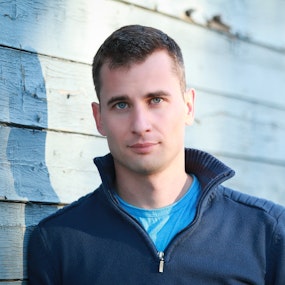
Tyler Foley
Author
Sean Tyler Foley is an accomplished film and stage performer and has been acting in film and television since he was 6 years old. He has appeared in productions including Freddy Vs Jason, Door to Door, Carrie, and the musical Ragtime. Tyler is passionate about helping others confidently take the stage and impact an audience with their stories. He is currently the Managing Director of Total Buy In and author of the #1 best-selling book The Power to Speak Naked.




